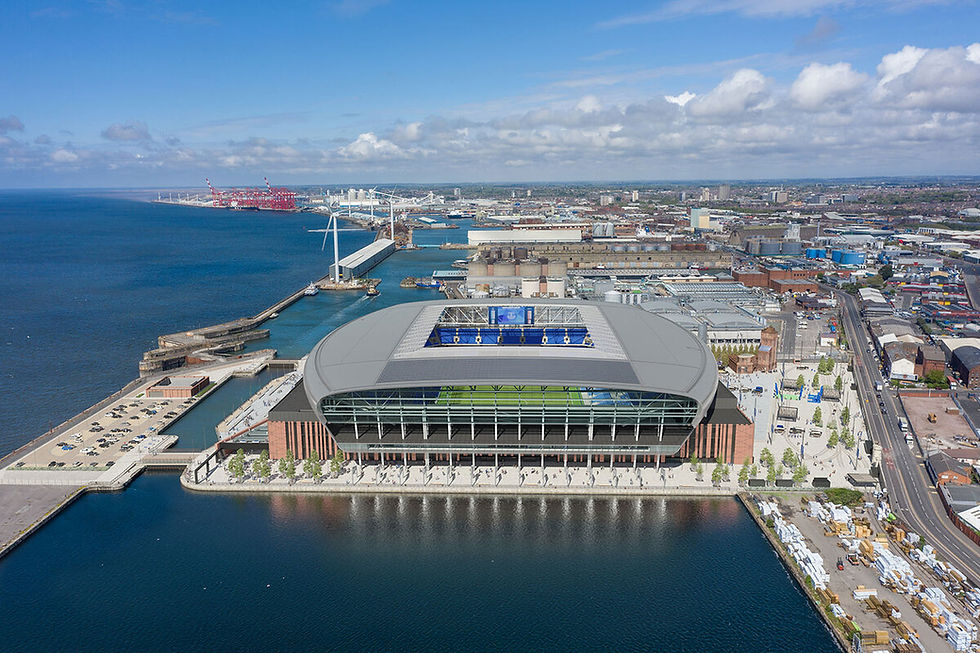But will Hill Dickinson have a soul?
- Ross Moughtin

- Aug 22, 2025
- 3 min read

But will the Hill Dickinson ever have a soul?
This Sunday Everton play their first proper match at their brand new stadium at Bramley-Moore Dock with some 50,837 in attendance for their match against Brighton & Hove Albion.
An impressive venue, it didn’t come cheap. Everton’s official club page gives £760 million as the estimated cost but recent media coverage suggests £800 million. A huge investment for a new era as the club finally cuts all ties from its Christian past.
Famously the ground at Goodison Park had a Victorian parish church prominently tucked right into the corner between the Gwladys Street End and the Main Stand: St Luke the Evangelist. I’ve actually stood in the church’s small memorial garden – amazingly a tiny oasis of calm within feet of the corner flag.
For me, the story of Everton FC is a narrative of our age, even a sad commentary of our culture and the irresistible march of secularism.
You will know the history – I’ve told it often enough, including my recent booklet on the story of the Christ Church Ministry Centre (which I can still mail you for £5)
Way back in 1871 St. Domingo Methodist New Connexion Chapel was opened in Breckfield Road North, Everton. Some six years later Rev. Ben Swift Chambers was appointed minister. One of his first ventures was to create a cricket team for the youngsters in the area but, as cricket was only played in summer, there was room for another sport during winter.
So in 1878 he founded a football club not surprisingly called St. Domingo's F.C. with their first match being played at Stanley Park against St Peter’s church, winning 1-0.
As interest grew beyond the congregation, the name changed in November 1879 to Everton Football Club, reflecting the wider district. However, the close relationship between St Domingo’s church and EFC continued, even following the split forming Liverpool FC.
For many years the St Domingo church treasurer was closely involved in club finances, even into the 1930’s when speaks to a time when community, faith, and football were inseparable.
However, the steady stride of secularism was confirmed on 27 January 1974 when Everton played West Brom in the FA Cup 4th Round. This was the first time for both clubs when a match was played on a Sunday, something unthinkable a generation earlier.
Even so while still at Goodison Park the club resolved never to play a game during a service at St Luke’s, not that Sky Sports ever schedules a match at that time for the simple reason that the economics don’t add up.
So here we are in a new era, a brand new world – a gleaming new stadium at the heart of an urban regeneration project. But will it have a soul?
A fascinating article in last Saturday’s Times by James Marriott, headed Full-fat faith: the young Christian converts filling our churches.
The byline: “Few would have predicted a comeback for Christianity, but a backlash against secularism looks less surprising set against the backdrop of global turmoil and a search for lost meaning and connection.”
The columnist writes of the perceived religious revival amongst young people, a trend I notice is also being tracked by the New York Times. The dominance of our secular culture is being challenged head-on.
“It was widely held that the world was soaring ineluctably along an arc of enlightened progress,” he observes. “We were all destined to become richer, more democratic, more just, more rational and more secular. But those optimistic beliefs have been sorely tested in difficult recent years.”
Marriott continues: “Anyone tempted to simply dismiss the idea that religion could ever revive may not grasp how dramatically the cultural and economic landscape inhabited by young people has changed.”
He speaks of the young Christian converts he interviews as having “a sense of disaffection with and even contempt for the triviality and banality of secular society.”
One new Christian, the writer and podcaster Louise Perry, puts it flatly, “secularism has failed”. Once an “annoying teenage atheist”, she now attends a happy clappy church every Sunday with her family.
Religious people, she says, “are happier, less anxious, less lonely, more likely to get married and have children… not having religion in your life is an enormous loss. I think that of all the religious options Christianity is the one which generates the greatest human flourishing.”
It will be some years before the Hill Dickinson becomes a repository of memories and yet with all its glamour and superb facilities will it allow God his rightful place? For as Marriott concludes: “If man is a religious animal, God may never really be banished.”



Comments